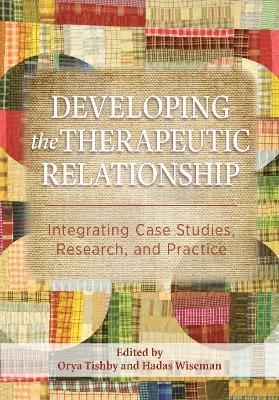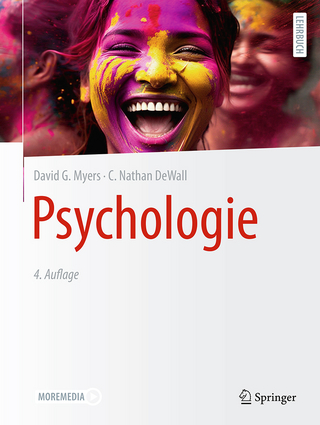
Developing the Therapeutic Relationship
American Psychological Association (Verlag)
978-1-4338-2922-2 (ISBN)
In this book, master clinicians and psychotherapy researchers examine how technique and the therapeutic relationship are inseparably intertwined, and engaging case studies demonstrate how successful therapists negotiate this complex relationship.
What makes therapy work? Clearly, the therapeutic alliance is an important component of a successful relationship between therapist and client, but how does it fit into the relationship more broadly conceived? A better question might be “What works with whom and in which circumstances?’
Using a variety of theoretical and research “lenses” and drawing on various models of psychotherapy, including psychodynamic therapy, cognitive–behavioral therapy, emotion‑focused therapy, and brief family therapy, the contributors discuss the factors affecting client outcomes. The link between relationship processes and technique is bought to life in a rich array of engaging case studies that demonstrate how successful therapists negotiate the relationship, make key moment‑to‑moment decisions, and promote positive change in their clients.
Orya Tishby, PsyD, received her master’s degree from Hebrew University and doctorate from Rutgers, where she received the 1991 Best Dissertation Award from the New Jersey Psychological Association. She is an associate professor in clinical psychology and clinical social work, Hebrew University of Jerusalem in Israel, and is the former director of the Hebrew University Psychological Services. She is head of the clinical psychology graduate program, and clinical faculty at the School of Social Work and Social Welfare, as well as the director of the Freud Center for Research in Psychoanalysis. Dr. Tishby practices and supervises long- and short-term psychodynamic psychotherapy, and her research focuses on the therapeutic relationship and countertransference. She is coeditor (with Hadas Wiseman) of The Therapeutic Relationship: Innovative Investigations. Hadas Wiseman, PhD, completed her doctorate in clinical psychology at York University, Toronto, Ontario, Canada. She received clinical training at the Clark Institute of Psychiatry, Toronto, and at the Psychological Services at Hebrew University, where she also completed her postdoctorate. She is currently a professor in the Department of Counseling and Human Development, Faculty of Education, at the University of Haifa, Israel, and chair of the doctoral studies committee of the Department of Counseling and Human Development. Dr. Wiseman is also on faculty in the Weiss–Livnat International MA Program in Holocaust Studies, University of Haifa. Her scholarly work and research has focused on psychotherapy process, the therapeutic relationship, attachment and relationship patterns in psychotherapy, personal and professional development of psychotherapists, and intergenerational trauma and interpersonal relationships in families of Holocaust survivors. She served as president of the International Society for Psychotherapy Research. She coauthored (with Jacques P. Barber) Echoes of the Trauma: Relational Themes and Emotions in Children of Holocaust Survivors and coedited (with Orya Tishby) The Therapeutic Relationship: Innovative Investigations. Dr. Wiseman is a certified clinical psychologist in private practice in Kiryat Tivon, Israel.
Contents
Contributors
Introduction
Orya Tishby and Hadas Wiseman
Chapter 1: The Psychotherapy Relationship: Where Does the Alliance Fit?
Adam O. Horvath
Part I: The Case Studies: Integrating Research and Practice
Chapter 2: You Can’t Cross the Same River Twice: A Case Study of Alliance Rupture and Repair
Laura Kohberger, Jeremy D. Safran, and J. Christopher Muran
Chapter 3: Patient and Therapist Relational Patterns: Implicit Negotiations
Emanuel Schattner and Orya Tishby
Chapter 4: Closeness and Distance Dynamics in the Therapeutic Relationship
Hadas Wiseman and Dana Atzil-Slonim
Chapter 5: Facilitating the Sense of Feeling Understood in Patients With Maladaptive Relationships
Sigal Zilcha-Mano and Jacques P. Barber
Chapter 6: Clinical Choice Points and Professional Ethics in Psychoanalysis
Gaby Shefler
Chapter 7: The Therapeutic Relationship: A Warm, Important, and Potentially Mutative Factor in Cognitive–Behavioral Therapy
Louis G. Castonguay, Soo Jeong Youn, Henry Xiao, and Andrew A. McAleavey
Chapter 8: Negotiating Multiple Roles and Stances in Cognitive–Behavioral Therapy
Yoni Elizur and Jonathan D. Huppert
Chapter 9: Affirming the Case for Positive Regard
Barry A. Farber and Jessica Y. Suzuki
Chapter 10: Empathy and Responsiveness in Emotion-Focused Therapy
Jeanne C. Watson
Chapter 11: Where the Alliance and Systems Theory Meet in Brief Family Therapy
Laurie Heatherington, Valentín Escudero, and Myrna L. Friedlander
Chapter 12: The Use of Immediacy in Supervisory Relationships
Clara E. Hill and Shudarshana Gupta
Part II: Mapping Models and Conclusions
Chapter 13: Mapping Models of the Therapeutic Relationship: Implications for Integrative Practice
Stanley B. Messer and Daniel B. Fishman
Chapter 14: Conclusions: The Tapestry of the Therapeutic Relationship and Recommendations for Clinicians and Researchers
Orya Tishby and Hadas Wiseman
Index
About the Editors
| Erscheinungsdatum | 20.09.2018 |
|---|---|
| Verlagsort | Washington DC |
| Sprache | englisch |
| Maße | 178 x 254 mm |
| Themenwelt | Geisteswissenschaften ► Psychologie ► Klinische Psychologie |
| Geisteswissenschaften ► Psychologie ► Persönlichkeitsstörungen | |
| Medizin / Pharmazie ► Medizinische Fachgebiete ► Psychiatrie / Psychotherapie | |
| ISBN-10 | 1-4338-2922-3 / 1433829223 |
| ISBN-13 | 978-1-4338-2922-2 / 9781433829222 |
| Zustand | Neuware |
| Haben Sie eine Frage zum Produkt? |
aus dem Bereich


